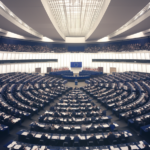
In an open letter addressed to the key institutions of the European Union, the United Nations High Commissioner for Human Rights has emphasized the importance of integrating human rights law into the fabric of the proposed European Union Artificial Intelligence Act (AI Act).
The letter, penned by Volker Türk, praises the EU’s ambitious regulatory attempt, which is poised to set a global precedent in AI governance. It underscores the necessity for the AI Act to be deeply rooted in human rights to navigate the complex implications of AI technology on people’s rights and everyday lives.
The AI Act aims to establish a comprehensive framework for AI usage within the EU. It categorizes AI applications according to their potential risk to people’s rights and safety, proposing a ban on certain AI practices deemed as high-risk and setting stringent requirements for developers and deployers of AI systems.
However, the UN’s letter voices concerns over proposals that could allow companies to self-assess and potentially exempt themselves from the stringent requirements for high-risk AI applications. This self-assessment could pose significant legal uncertainties and weaken the enforcement and accountability mechanisms envisioned by the AI Act.
The letter also advocates for stringent limits on biometric surveillance and individualized crime prediction tools, reflecting the growing global unease over intrusive surveillance practices. The UN High Commissioner for Human Rights endorses the European Parliament’s strong stance on these issues, supporting a ban on biometric recognition tools that categorize individuals based on protected characteristics and those that seek to infer people’s emotions or predict individualized crime patterns.
Moreover, the High Commissioner champions the proposal for comprehensive fundamental rights impact assessments (FRIA), a practice that would ensure AI regulation is aligned with human rights. The letter argues that such assessments are feasible, as demonstrated by leading AI companies adopting rights-based approaches to risk management.
The letter also touches on the critical role of standard-setting organizations and the need for transparency, accessibility, and accountability in the processes of standard-setting under the AI Act.
In the context of biometric technology, it’s worth noting that the United Nations, through agencies like the UNHCR, has utilized biometrics to enhance the protection of refugees and displaced individuals. This demonstrates a nuanced view of biometric technology, acknowledging its utility when applied with safeguards for human rights and privacy.
While the UN supports the use of biometric data for humanitarian aid and protection, it also clearly advocates for a cautious and rights-respecting approach in the deployment of AI and biometric surveillance technologies in broader applications, a stance that resonates with the ongoing discourse around the EU’s AI Act.
Türk says the UN High Commissioner for Human Rights remains ready to assist the European Union and its Member States in refining the AI Act to ensure it upholds the promise of protecting and promoting the human rights of all individuals.
Source: OHCHR
–
November 8, 2023 – by the FindBiometrics Editorial Team







Follow Us